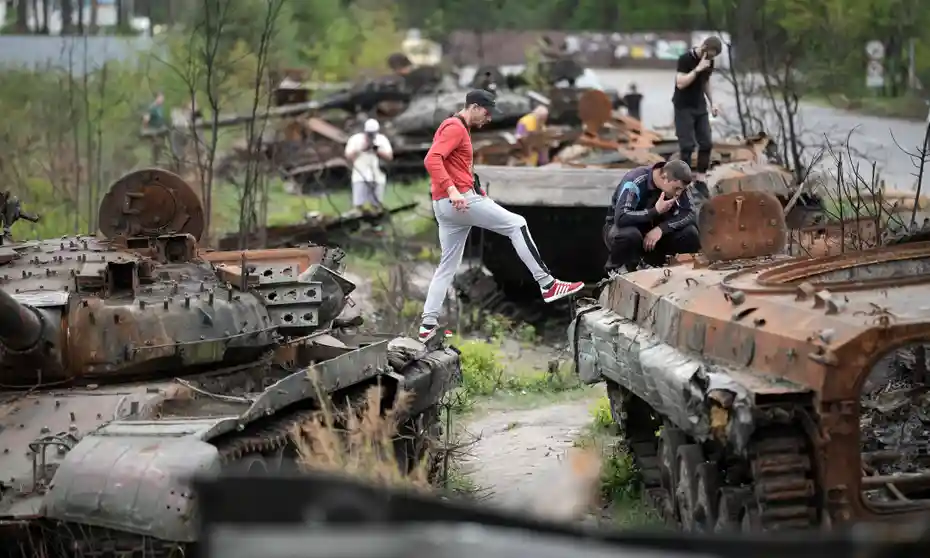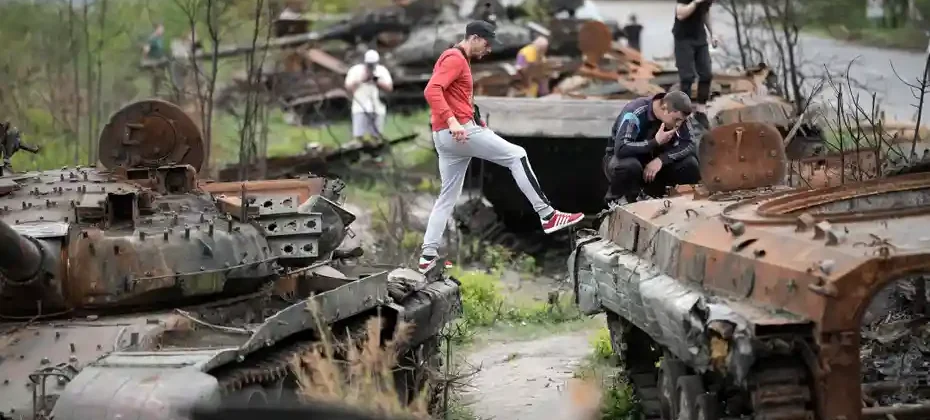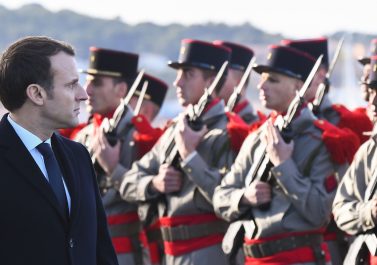
This contribution to our debate on Ukraine was written by a comrade who was also the main author of this previous article on the current war.
For those who support workers self organisation as a path towards ending the power of capital the article was intended to contain very few surprises. In common with both our class allies and class enemies we saw the looming reality of war in Ukraine. Since then, all the appalling horrors have come to pass. While gangs of robber capitalists wave national flags and pump out streams of propaganda, we are left with shattered minds and bodies, our homes destroyed, starvation and disease. Forced migrations, death in various unthinkable ways and appalling acts of degradation are the “order of the day”. From the massacres of civilians to the shooting of prisoners to rape and mutilation the horrors of war has no bounds.
Our class hatred was expressed at the potential that workers in Ukraine would share the experience of the barbarism that creeps across the planet – Our class siblings in Yemen and Syria have suffered years of the new “wars without end” as different capitalist interests supervise the slaughters to further the interests of their own factions. Now, three months later, we have witnessed the horrors of war on a scale not seen in Europe since 1945. During those months it has become clear both amongst ourselves and to readers of our site that we have differences within the collective.
To date we have presented a confused picture to our ‘periphery’ who follow the site. If they were expecting a single centrally engineered ‘party line’ then they will have been disappointed and need to look elsewhere, as perhaps they should already have been doing. On the other hand, we have chosen not to make clear to the readers what we are saying/doing collectively or whether there are positions held by different strands. The reality is that, for whatever reason, we are content to publish a series of unascribed articles giving different angles. Militants who relate to us are invited to ‘pay their money and make their choice’.
In the initial article (see above) we were critical about clever commentators [who] sit well away from the mayhem proclaiming which gang of cutthroats should be supported. We noted that every trick around the concept of “just war” has been churned out to support one or other side whenever the horrors of war start. References to a handful of illustrative instances where left wing organisations and individuals have played a prominent role in such a process were removed during the redrafting process.
Predictably, the fact that we removed the references from the published version did not mean that examples of the problem would not occur when the war in and around Ukraine started. For the record, it is clear that there are many on the left who argue for the political legitimacy of the military struggle being carried out by the Russian state, supported by its geopolitical allies, or by the Ukrainian state supported by its allies/sponsors.
Central to ‘proletarian internationalism’ is an approach that precludes either of those positions, but it has become clear that it is necessary to be more explicit about how that approach links with the commitment to working class autonomously driven self-organisation. That latter shared understanding is central to the perspective around which the expanded collective has
gathered.
The pro-revolutionary minority – not passive majoritarians
In the past, comrades have expressed disquiet about the use of the term ‘the revolutionary
minority’ to describe those organisations and individuals in the working class who have an understanding of the possibility and necessity for a ‘social revolution’ i.e. an end to the power of capital. (For a critical response, see this article) Certainly it is right that comrades should steer clear of any impression that those seeing the need for the social revolution do so because they see themselves as a ‘government in waiting’. It seems totally clear that nobody in the collective has a vision of a transformation to the new society being achieved in a Blanqui-ist manner by the enlightened few taking power on behalf of the class.
However, it is a major mistake to imagine that the ‘pro-revolutionary minority’ does not exist or have a role to play. This flows from the fact that class consciousness (the collective awareness of the possibility and necessity of the social revolution) is not spread evenly amongst the class and varies across location, class segmentation and points in time. There is cause to return to this point to avoid arguments that relegate the work of the collective to a variant on us being passive observers of class society as it exists, acting as mere echoes of the majority attitudes of segments of the working class at a given point.
For sure the ‘pro-revolutionary minority’ discusses with, analyses and learns from the experiences of the working class both past and present but we don’t do so to merely act as a mirror. The fact is that in our day to day praxis we implicitly recognise that the ‘pro-revolutionary minority’ both has a different perception of the world and commits its energies to activities which are different to the majority of our class. Without dwelling too long on the point it is clearly only a minority of the class who choose to carry out projects such as Greenford https://libcom.org/article/greenford-love-interview-angry-workers-west-londons-warehouses and then write a substantial book detailing the experience. Likewise we produce material such as ‘For a new society’ to propound an understanding that is not prevalent in the majority, or even a significant minority, of the class.
We talk with working class people to better understand the class’s ‘real movement’. To make meaningful use of those conversations into a better understanding of the class struggle a degree of synthesis takes place with other material including previous analyses and frameworks. Why return to such ‘ABC’? We need to understand why the ‘pro-revolutionary minority’ sometimes needs to stand ‘against the stream’ when the majority of our class comrades, even those most directly involved, interpret the world differently and choose different courses of action. Those who cannot remember the past are condemned to repeat it
There have been many times in ‘the imperialist epoch’ (i.e. since early in the last century) where the majority of the working class in any national territory have spent periods supporting, with varying degrees of enthusiasm, the ‘national war effort’ despite the death and suffering experienced by themselves and by their fellow workers. It was certainly the case in the early years of the First World War, in many territories during the Second World War and for periods during many of the wars for or against ‘national liberation’.
Of course, in all those instances there were those who called themselves socialists, communists or even Anarchists who chose to bloc with their own national ruling class. They called on workers locally to act against the opposing military. They also explained why those who lived elsewhere should side with their class enemies in defence of ‘their nation’ or often in favour of the defence or extension of wage slavery in a ‘democratic’ political framework.
However, there have also invariably been a layer of the ‘pro-revolutionary minority’ who have presented the case for, and actively agitated for, class activity against all exploiting layers, whether state forces acting on behalf of their ‘own’ bourgeoisie or acting on behalf of an ‘occupying’ state. The subjective approach to advising militants to act as an inter-class bloc can be expressed openly by Social Democrats, Stalinists and on occasions Trotskyists. For the first named the argument is often presented around justice, international law or defence of democratic norms (those compatible with the power of capital, naturally!). Our ‘official Leninists’ will call on workers to fight wars in defence of states with economies directly owned or controlled by the state or on behalf of states that they have designated ‘anti-imperialist’.
In the debates in and around our collective when dealing with the war in Ukraine there have certainly been hints of the ‘anti-imperialism’ or the ‘defence of smaller/weaker nations’. However there have also been more nuanced suggestions, also expressed by the Polish IP comrades at a recent TSS Permanent Assembly meeting that, in reality, militants fighting in the Territorial Defence Forces (TDF) are expressing a version of ‘proletarian autonomy’.
Nature of the ‘armed resistance’
The ‘People and Nature’ blog recently carried a picture of members of the Independent Miners Union operating as a soldier on ‘the front line’. Possibly unconsciously, that summarises the way in which the workers’ functioning as part of the ‘life of the working class’, in their workplace and community, has been replaced by the day to day reality of living as a soldier. The living experience of interacting with fellow workers in and around the productive process, with all the potential that entails, has disappeared to be replaced with military discipline and the immediate likelihood of killing or being killed by individuals sucked from the working class by a different state.
Although analogies are dangerous, there is a strong case to argue that when swathes of the most class conscious workers were drawn into the Red Army in 1918 then the chances of developing and spreading the social revolution of late 1917 were severely diminished or perhaps even lost. In contrast to Ukraine today, that 1918-21 transformation of workers into soldiers in a state army [1], followed on from a massive revolutionary upsurge in Russia (Soviets taking control of towns and cities and peasants seizing the land) and a huge wave of class struggle elsewhere. No equivalent proletarian revolutionary advances have taken place in living memory.
The soldiers in the armies of Ukraine, Russia and the other forces involved (overtly or covertly) are, objectively and beyond doubt, operating as agents of their class enemy, the power of capital and its superstructure of states, alliances and military organisations. The comrades from Inicjatywa Pracownicza (IP) and others emphasise an argument that those serving in TDF are able to exercise a degree of autonomy. Frankly, that case is untenable for a number of reasons. Although none of us like to start with Wikipedia their page on Territorial Defense Forces (Ukraine) is a very easy entry point. For those who doubt the degree to which the TDF act as wing of the Ukrainian state military there are many ‘straight from the horse’s mouth’ sources.
This article was published on 7th January. It outlined the strengthening of the TDF as part of Ukraine’s preparation for war. The remit for the formations includes ‘[they] must ensure security and order behind the frontline … and render assistance in combating hostile subversive activities in their local areas’. So how does that square with a view of support for self-organised workers’ activity? Do we not seek to challenge the ‘security and order’ imposed by all the exploiters? If IP or others believe that the role of militants in time of war is to combat ‘subversive activities’ then they need to examine their understanding of class and resistance.
There are many other links available that emphasise the role of TDF as auxiliaries of the state’s military machine. This article reports the whereby the forces were created, entirely according to the plans of the Ukrainian state – ‘Ukrainian parliament passed legislation at the end of 2021 that made the territorial defence a standalone branch of the country’s armed forces as of the new year. At the time, it was thought that a Russian invasion wouldn’t happen for months, giving them time to prepare the new “weekend warriors”’. To paraphrase, they were created as part of the state preparation for war, not as a movement of the working class or oppressed to defend their own interests.
It is abundantly clear that it would be impossible for any TDF unit to act independently on behalf of working people or minorities. We have already seen the standard ruling class attitude during such a period of militarisation – ‘ensure security and order’ and ‘combat subversive activities’. Any move that contravened the war effort would result in the unit being disarmed and dispersed at the very least. In all probability military execution would be the class punishment. It is clear that the Ukrainian war effort depends on the flow of arms, logistical support, training, cyber warfare and finance from NATO via their member states including those in EU and UK. It is unthinkable that those channels would flow if the end recipients were liable to be beyond the control of the local militarised state.
There is also another misleading fantasy that has been peddled around the possible outcome of militants actively supporting the military conflict. Even when the ‘Ukrainian defencists’ concede that militants joining TSF have temporarily backed away from class struggle an argument has emerged that their presence in such forces sows the seeds for the future social revolution. In fact there is no historic precedent pointing to the likelihood of such an outcome.
Successful partisans in Europe – Prelude to the Social revolution?
20th century European history is not short of significant irregular military forces, many of whom operated with a much larger degree of immediate autonomy from any militarised state than is the case with TSF. If the comrades expect social revolution to emerge from that experience then they will look in vain. In fact, the forces were pushed into a number of situations after their backers won the global military conflict. None of the outcomes have the remotest resemblance to the social revolution / overturn of the bourgeois order. Very brief pen pictures would be –
- France/Italy – Disarmed militarily by the pro-allied regimes. Also disarmed politically, largely by
the Stalinist CPs, as Popular Fronts are created to re-establish democratic capitalist conditions
for exploitation and future crisis - Greece – Left wing guerillas slaughtered in a Civil War as the Anglo-American allies reassert
their domination - Poland – Warsaw, 1944. A two month long uprising by forces aligned with Britain. The Red
Army halted their advance which allowed the German military to crush the uprising and kill
most of the participants - Soviet Union – Other than those who disappeared into the gulags, Partisans re-entered the
state capitalist authoritarian monstrosity that was the Soviet Union - Yugoslavia and Albania – Beyond the reach of the Anglo-American or Russian armies, the
respective national guerilla movements, both politically influenced by Stalinism, were absorbed
into the controlling party/state. In both countries forms of state capitalism, with significant
superstructural differences, dominated for almost half a century
If the comrades know of historic experiences where military struggle has led to even an aborted social revolution then let us examine it. If there are no examples then let’s stop ‘whistling in the
dark’.
Militarism and the social revolution
Irrespective of differences that we may have about the ‘revolutionary wave’ of 1917-21, I am taking it as read that we broadly agree that the First World War was ended by working class activity expressing itself variously in strikes, riots, mutinies, factory occupations and revolutions. One of the key factors in that was the significant number of conscripted soldiers who turned their backs on war between nations and looked towards ending oppression and exploitation ‘at home’. They were aided in that by the presence of significant forces comprising our ‘pro-revolutionary minority’. The attitude of the ‘pro-revolutionary minority’ was in clear opposition to the ‘social patriots’. The latter included the vast majority of the Second Internationalist parties and also a renegade minority of Anarchists around the Manifesto of the Sixteen [2].
If we believe that there is anything of value in the history of our class then it is important to grapple with that point in our history where we threatened the whole of the world capitalist/imperialist order. Those soldiers and sailors who had been recruited into the armed forces of nations, large and small, broke with their commanders because they were no longer prepared to carry out the bloodletting that passed off as the ‘defence of the nation’ or even defending communities against aggressive bullies. The ability of the ‘pro-revolutionary minority’ to work positively with those forces depended on our political ancestors having been clear about the nature of war in the imperialist epoch. They understood that whichever state, alliance, army or navy fired the first shot or was the most vile and oppressive did not alter the need to support and develop class struggle as an antidote to the barbarism unleashed by the power of capital.
That ‘revolutionary defeatism’ applied even where a bigger aggressive power had launched a violent and oppressive attack. For sure in the autumn of 1914 the Germans did commit atrocious acts against Belgian civilians but minority socialists in Britain and France did not fall in behind the propaganda behind ‘gallant little Belgium’. They saw through the siren call to support ‘the lesser evil’. In fact it wasn’t that hard since the army of ‘gallant little Belgium’ had only recently carried out decades of the most horrific genocidal violence in the Congo Free State. Such are imperialist geopolitics, powers rise and fall but control by capital and its class remains undiminished.
So, to repeat, the opposition to war that came to fruition in the Revolutionary Wave was based on a clear understanding that class struggle is indeed our antidote to the barbarism that the imperialist world order ushers in. In case, comrades feel that the bullying by a bigger, stronger power, followed by invasion, the shelling of the capital city and the displacement of civilians somehow negates the case, then please examine our history.
Our comrades in Kon-Flikt have helped us all by reprinting –
“For us it was clear that, as far as the conflict between Serbia and Austria-Hungary was concerned, our country was obviously in a defensive position. Serbia is defending its life and its independence, which Austria was constantly threatening even before the Sarajevo assassination. And if Social Democracy had a legitimate right to vote for war anywhere, then certainly that was the case in Serbia above all. However, for us, the decisive fact was that the war between Serbia and Austria was only a small part of a totality, merely the prologue to universal, European war, and this latter — we were profoundly convinced of this- — could not fail to have a clearly pronounced imperialist character. As a result, we — being a part of the great socialist, proletarian International — considered that it was our bounden duty to oppose the war resolutely.”
Dušan Popović, 1915
Belgrade then, Kyiv now.
Inquiry trumping history?
A short selection of the texts, historically important to those arguing for revolutionary defeatism, was cobbled together in our previous discussions on the server [3]. However, there has been an undercurrent in our discussions that maintaining attitudes to war that have been established by generations of pro-revolutionaries is a ‘sterile’ approach or even an attempt to reject working-class self-organisation/autonomy. At times, there have also been hints that refusing to support the ‘armed resistance’ reflects a lack of compassion/humanity.
For myself, I will not try to compare my emotions with those of other comrades but will go with Henry James on ‘Never say you know the last word about any human heart’. At this stage, I will repeat a comment on the avoidance of suffering and destruction of class cohesion that I posted on Crabgrass on April 7th – We do get back to the question that a comrade raised several weeks ago when the population of Mariupol were experiencing the first stages of the abominations that they’ve now endured. At that stage our comrade posed the question as to whether objectively the working class would have better retained its cohesion and ability to exercise its class role if the Ukrainian armed forces had simply left the city. The answer looked pretty obvious then and is now indisputable.
In my view the rejection of key aspects of our political heritage runs the risk of leaving us rudderless with our praxis reduced to a form of empiricism. Being a collective which is of some use to the working class is not equivalent to only proactively gathering evidence and then examining and analysing each specific circumstance. Each of us could spend months, or probably years, scouring through and attempting to synthesise the hundreds of reams of geopolitical analysis dealing just with Central and Eastern Europe since 1989. Of course, for it to be meaningful we might need to go back to an earlier date and we’ll almost certainly want to look at shifts in and around China, Western Europe etc. etc. Or we can find a blog written by someone we feel an affinity with and decide to follow their lead. Frankly, both approaches have their pluses and minuses.
At the core of the praxis of all healthy parts of the pro-revolutionary minority is something more. The fact is, we and our comrades in other fractions, tendencies, organisations etc. do accept elements of practice and understanding that we have assimilated and perhaps refined from previous generations and others around us. Chapter 12 of ‘Class Power on Zero Hours’ could not have been written if that process had not taken place. Similarly it is not believable that the sections of ‘For a new society’ could have been produced only as a result of reflecting on discussions with workers in West London.
For sure, there are aspects of old formulations that historic development make redundant. A prime example for me is the question of Polish statehood. It was a key issue around the founding of the First International but Luxemburg and others were able to analyse that historic development had separated out any progressive content from the issue. However, if we ditch ‘the old certainties’ because we have an analysis that claims to supersede it that is something which is critical and needs treating with extreme caution.
Analogies can indeed be dangerous but for many decades many of us have had to counter arguments that ‘class is dead’, that the fundamental social relationships in capitalism have somehow disintegrated and that we should abandon a perspective of human liberation based on working class self liberation. I believe, perhaps wrongly, that the collective would prefer to maintain perspectives based on fundamental understandings of 150 years rather than to, in that case, abandon our commitment to maintaining and deepening our connections with the rest of the class. That does not make us dogmatic but does mean that the essential parameters of our praxis remain in place until we are convinced that the changing nature of class society justifies a fundamental shift.
I have also been aware that some comrades feel that adopting the ‘revolutionary defeatist’ approach that I and others have outlined is connected to a failure to recognise the ‘agency’ of those directly involved. I would have preferred to explain in my own words but due to time constraints I cut and paste from a conversation on social media from a comrade, JW.
“This stuff about the agency and subjectivity of countries (oppressed or otherwise) is liberal gas lighting. It alludes to the unpleasant spectacle of sympathisers with oppressed social groups (gays, women, people of colour) patronising them by the assumption that they are passive victims unable to contribute to their own liberation. But the entities referred to here are not oppressed social groups, or even countries, but (minor) bourgeois states. As such the agency is that of their capitalist classes — and is indeed limited, as it reduces to a choice of which gang of bigger capitalists to seek protection with”
The first sentence referred to the approach by some advocates of ‘Ukrainian Defencism’ where non-recognition of agency is used as an accusation against those who refuse to advocate support for any state army during this war. The core of the counter-argument is in the final two sentences. Revolutionary defeatists/ No War But the Class War, or however we may be tagged, do not accept
that segments of our class suffering exploitation should be abandoned, or even encouraged, to become auxiliaries of the forces of capital or their state machines.
Answering a few questions
- What should workers in Ukraine be doing?
The question is often asked when it becomes clear that, as a socialist, I do not support either the Russian or Ukrainian military machine and refuse to advise fellow workers to voluntarily take part in the current or future wars [4]. In short, none of us in AngryWorkers are in a position to tell any worker in Ukraine what their next steps should be. If any of them asked for our advice (why should they?) then the current conversation would probably start and end with how they and those close to them can survive the hell of war.
- What should militants in UK be doing?
Here, the comments are centred around what we as a collective can do. I would argue that we also need to be aware of what other pro-revolutionary fragments are doing. We need to seek common ground and synergies wherever possible. It is important that our opposition to the state’s war mongering is linked to our commitment to understanding and supporting the ‘living movement’ of the class where we have direct contact. The draft leaflet at the end of https://www.angryworkers.org/2022/03/10/fragments-of-a-debate-amongst-angryworkers-on-the-war-in-ukraine/ was a good start that needs developing or even (IMO) using as it stands as part of local interventions. Recognising our limited numbers and range of commitments we need to identify opportunities to work with others on Ukraine related issues. These could include fund raising, highlighting the work and fate of anti-war campaigners, connecting with those campaigning around refugees and migration and anti-arms trade activities.
- Working with TSS?
The Transnational Social Strike initiative ( https://www.transnational-strike.info/) and the Permanent Assembly Against War that grew out of it is an arena which is relevant to the tasks
referred to above. During its meetings and in work and discussions beyond them comrades have increased our ‘aware[ness] of what other pro-revolutionary fragments are doing’ and, to a degree sought ‘common ground and synergies’. My limited work in assisting the drafting of the May Day call out was a small effort to try and carry out that approach. Over the next few months we should continue to explore common activities with other UK-based signatories, particularly Plan C, but our overall future involvement with TSS should be discussed at the May meeting if time allows.
- Asking some final questions – probably should have been asked earlier
In what sense is the armed struggle of TDF understandable other than as part of the war
being carried out by Ukraine with the backing of NATO?
Would comrades encourage fellow workers in UK to refuse to handle arms shipments to
Ukraine (as has happened in Italy and elsewhere)?
Where possible would fraternisation with Russian conscripts be a good idea?
In the present day, how should socialists decide which military actions to support, if any?
KIT / May 2022
[1] This refers to the ‘Red Army’. Particularly relevant to the history of class struggle in Ukraine would be further inquiry into the role and legacy of Makhno’s Black Army. At the very least their slogan of ‘Death to all those who oppose the toilers’ contrasts sharply with other responses in time of war.
[2] A statement issued in 1916 calling for support for the Entente powers. Kropotkin was amongst the signatories.
[3] In the posts in Crabgrass/Reading Group 2022 Schedule
[4] We are not liberal pacifists. There may be circumstances where class conscious militants enter armed forces either because of conscription or as a tactical decision. In those circumstances, their role is to sow the seeds, and later fan the flames, of mutiny and revolution.



